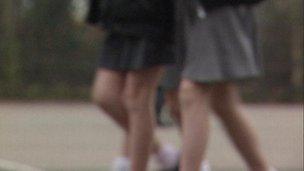'Vigilante' parents confront online paedophiles
- Published

The Letzgo Hunting group say they posed online as teenage girls to "get an explanation"
A group of parents have formed a "vigilante" group to confront paedophiles by posing as young girls online.
The four parents, calling themselves Letzgo Hunting, said they had challenged seven men in person after chatting with them on the internet.
Four men have been arrested based on evidence gathered by the group.
But police said their tactics could have a "negative effect" on child abuse victims and their success in court.
Leicestershire Police said that last month they arrested a 54-year-old man in Warwickshire, a 24-year-old man in Loughborough, and a 33-year-old man in Hinckley.
A 45-year-old man was arrested in the West Midlands last week. All are currently on police bail pending further enquiries.
'Talk to them'
One member of Letzgo Hunting, who calls himself Scumm Buster online, defended the group's activities.
Speaking to BBC Radio 5 live's Victoria Derbyshire, he explained: "We are vigilantes, definitely. We're not working within the law. But we're not a vigilante lynch mob.
"We're not there to hurt anybody. We are there to get an explanation."
He said the group - three men and one woman - posed online as girls aged between 12 and 15. They chatted to men online, some of whom wanted to have intimate conversations of a sexual nature.
"We try to get them to say, in as much detail as possible, exactly what they want to do," Scumm Buster said.
Some online exchanges are held "over a month or two, because the more they say, the more can go into their prosecution", he added.
The men then suggest a meeting, local to where the "girl" lives. They are asked to bring condoms and alcohol.
The meeting sometimes involves the female member of the group waiting in an open, public area to encourage the man to get out of his car.
"Once out of the car, we make it very clear that we're not there to be offensive to them, we're not there to hurt him, and we're only there to have a talk to them about what they're doing," Scumm Buster said.
He also stressed the purpose of the encounters was "to show their intent", and to demonstrate that the men were breaking the law under the Sexual Offences Act 2003 by inciting a child to participate in a sexual act.
"While they are on the internet - in a fantasy world - saying they are going to do this and that, there are no particular laws broken.
"Once they show up and make it very clear that their intent is to meet the person for sex, that's the bit where the law is actually broken."
Of the nine people the group say they have met since January, seven were spoken to while being filmed, and the other two drove away from the meeting place.
The group said they had given car registration numbers to the police.
Asked how he felt at the meetings, Scumm Buster said: "Anger, of course. It would be unnatural if I wasn't feeling angry.
"We're angry, we're upset. The things we see them say, I wouldn't normally say to my partner. It's too offensive - it isn't right the things they are saying."
Abuse victims
However, Leicestershire Police said it did not endorse such tactics and urged people with suspicions of child abuse to contact police, Crimestoppers or the Child Exploitation and Online Protection Centre (CEOP).
"Unfortunately, these kinds of public 'naming and shaming' activities can actually have a negative effect on victims of child abuse.
"While we understand the strong feelings that motivate this kind of activity, it can seriously affect the chances of success in court, preventing victims from getting justice and increasing the chances of offenders walking free.
"It also fails to take into account that many victims of child abuse are children or family of the offenders, thus bringing extra distress to innocent people and affecting our ability to safeguard victims."
CEOP also warned of the consequences of unlawful activity by vigilante groups.
"While we understand the public's desire to protect their children from online abuse, we do not encourage vigilante investigations of this nature as they can compromise ongoing investigations into paedophile networks, and could spark an abuser to harm a child if they feel threatened.
"Identifying alleged paedophiles is best left to the police and suspected incidences of online grooming can be reported to CEOP."
- Published4 February 2013
- Published18 March 2013